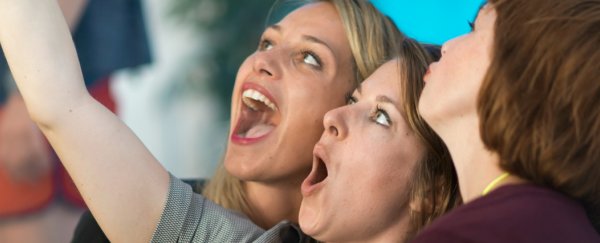Hate the way you look in all your photos? Sorry, but that might actually be your face, new research suggests. In fact, the study shows that we're so terrible at recognising what we really look like in images, we'd be better off letting a stranger choose our next profile pic or passport photo.
Scientists from the University of New South Wales (UNSW) in Australia have found that people are 7 percent worse than a stranger at ranking which of their photos look the most like them. The research was intended to provide insight into the challenges of photo identification in situations such as border control, but it might also shed some light on why it's so hard to find a picture we like of ourselves - apparently, we're just deluded about how the rest of the world sees us.
"It seems counter-intuitive that strangers who saw the photo of someone's face for less than a minute were more reliable at judging likeness," lead researcher Davie White said in a press release. "However, although we live with our own face day-to-day, it appears that knowledge of one's own appearance comes at a cost. Existing memory representations interfere with our ability to choose images that are good representations or faithfully depict our current appearance."
White's team had previously shown that passport controllers are no better than university students when it comes to identifying people based on their photo, and that the ability to identify a face varies widely between different photos. But this time they decided to take the research further, and find out how well people could recognise their own face.
To do this, they asked more than 130 undergraduate students to download 10 photos of themselves from Facebook, and then rate them in order of which looked the most to least like them in real life. They then got the students to film a one-minute webcam video of their face, and took two still photos of them - one smiling, and one neutral.
Based on this, the researchers asked 16 strangers to rate the same Facebook photos. They also had another group of 73 strangers complete an online face-matching test to impartially rank which photos looked the most like the participants.
The researchers found that not only did strangers rank the 10 profile pictures in a very different order to the participants, but their results were actually 7 percent more accurate when compared to the online face-matching test.
So why are strangers better at identifying your face than you are? This is because of something called the mere-exposure effect, which is where we grow to prefer something the more familiar we are with it. It's the reason we hate the sound of our own voice played back - we're so used to hearing it reverberating inside our head, that its real tone seems wrong to us - and studies have shown the effect applies to everything from art and literature to music.
When it comes to the way we look, the appearance we're most familiar with is the one we see in the mirror every day, where our features are reversed. That doesn't mean we look better or worse in real life, just that we're going to prefer our reflection - which also explains why people often favour their reverse camera selfies over photos someone else has taken of themselves.
Interestingly, the research also found that people were better at assessing whether someone looked like their photo when they smiled. "Given that faces are generally pictured smiling, and these images are rated as being more like familiar faces, it may be beneficial to permit expression in passport photographs," said White. The results have been published in the British Journal of Psychology.
So now we have scientific evidence that we're terrible judges of what we really look like and when we look best, maybe we'll finally give up on all the duck-face selfies… please?
Find out more about the research happening at UNSW Science.
